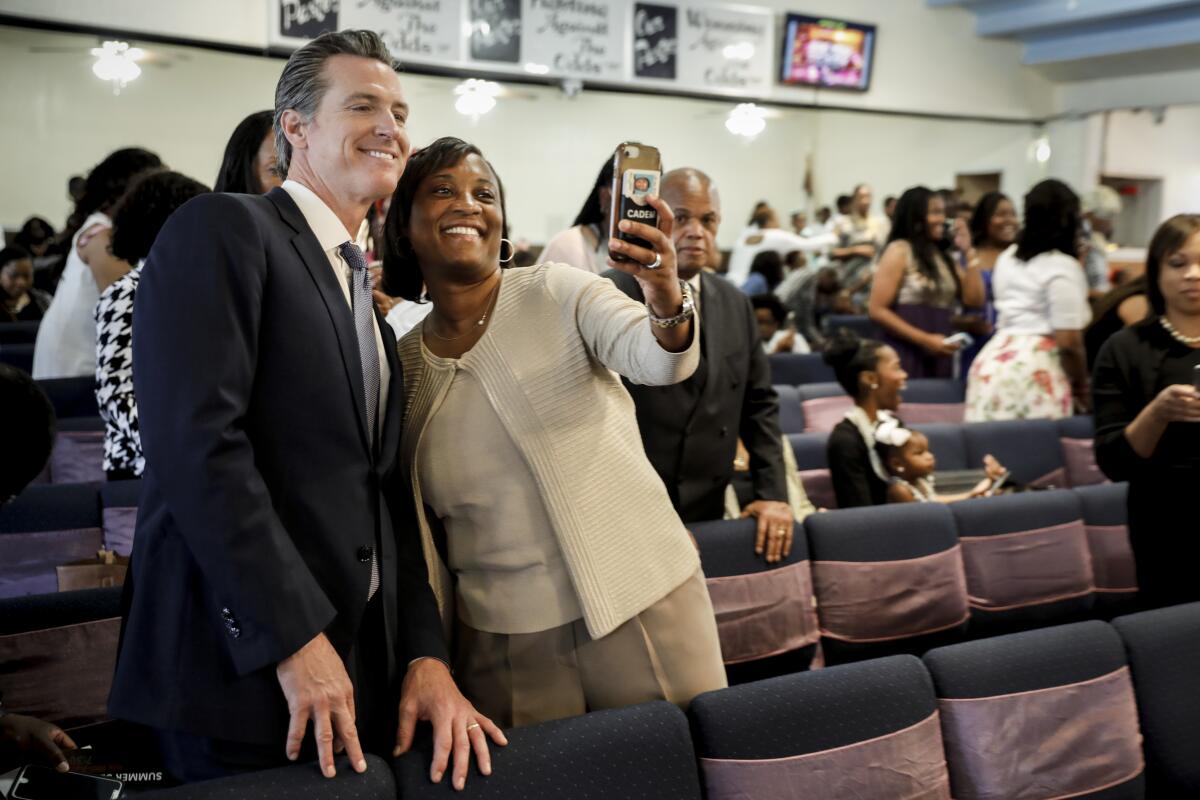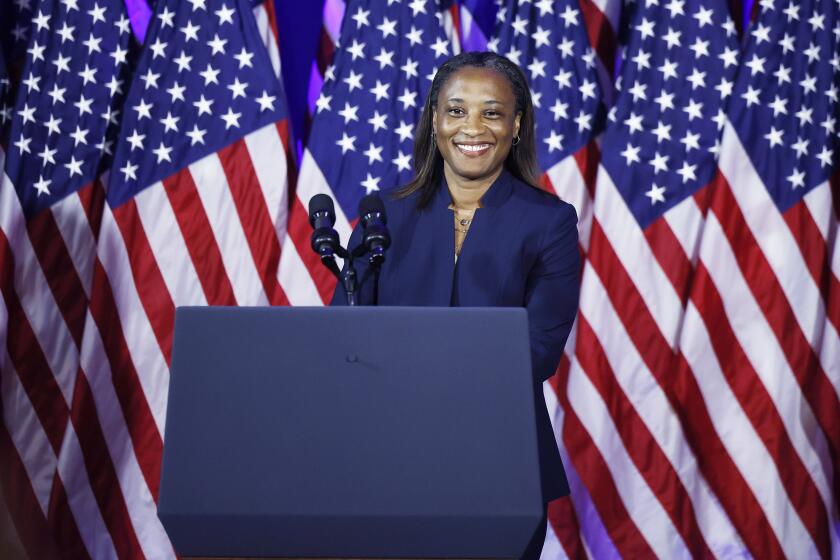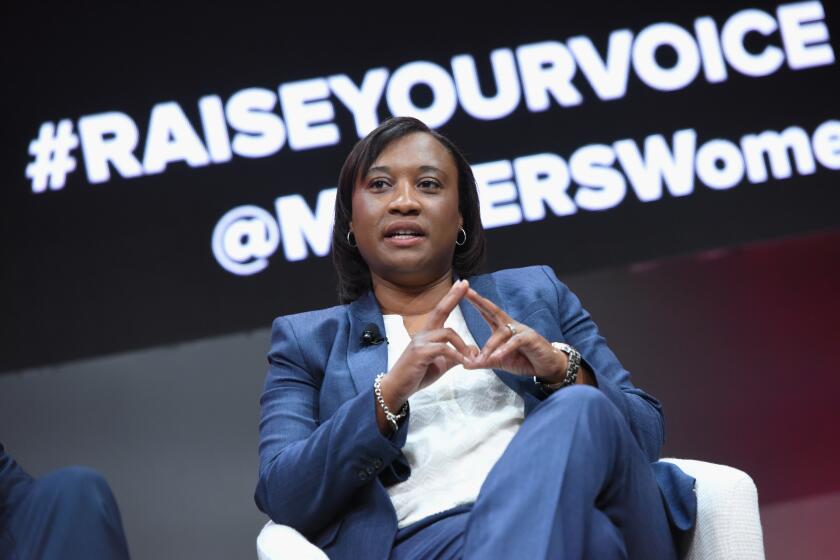How Newsom made his surprise decision for Senate pick

The death of Sen. Dianne Feinstein last month left a California U.S. Senate seat vacant and, seemingly, put Gov. Gavin Newsom in a no-win situation of his own making.
But Newsom didn’t see it that way.
“Everybody else said, ‘Well, he’s painted himself in a corner,’” Newsom told reporters in San Francisco last week. “I found that a little offensive. I didn’t paint myself in a corner. Quite the contrary. I think we just provided ... ample evidence of one of the most extraordinary, outstanding young leaders.”
Last month Newsom repeated his pledge that if Feinstein left office due to her failing health, he would appoint a Black woman to fill her seat in the interim until her term ends next year. He said he would not appoint any of the candidates currently vying in the 2024 contest for the seat, including the top Black woman in the race, Rep. Barbara Lee of Oakland, because he didn’t want to tip the scale of the election.
After Feinstein’s death, Newsom appeared to face a choice: Appoint a caretaker until November and face scorn for only symbolically supporting Black representation, or appoint Lee and suffer the wrath of the other powerful Democrats vying for the seat.
Instead, Newsom chose an option that avoided both. He appointed Laphonza Butler, who has a fighting chance to retain the seat next year if she chooses to run, and will let her make that decision without his influence.
Newsom’s decision to tap Butler, an advocate for women’s reproductive rights and a former labor leader, as California’s next senator elicited mixed reactions: praise from those who know her, questions from those who don’t and criticism that the former Californian lived in Maryland until last week. As Californians wait for her decision on whether to run in the 2024 Senate race, the rebukes many anticipated to come Newsom’s way from within the Democratic Party, particularly from Lee’s supporters, have been muted.
“The important thing was that he made a choice that’s someone who looks like an immensely qualified senator, who’s going be a formidable candidate if she decides to run,” said Thad Kousser, a professor of political science at UC San Diego. “So how you make the choice and the media narrative that week is much less important than the choice that you make and what that means for California’s representation in the Senate going forward.”
Laphonza Butler, Gov. Gavin Newsom’s appointee to the U.S. Senate, says she wants to carry the baton of Sen. Dianne Feinstein.
Newsom had been under near-constant pressure to address a potential replacement for Feinstein since last year, when questions about her age and mental capacity and, later, her health began to swirl.
Speculation about his possible choice intensified after an interview with Chuck Todd on “Meet the Press” last month.
Newsom told Todd he would make an “interim appointment” to the seat if Feinstein stepped down. With powerful California Democratic Reps. Adam B. Schiff of Burbank, Katie Porter of Irvine and Lee running for the seat in 2024, all jumping into the race after Feinstein announced she would not seek another term, Newsom also said he didn’t “want to get involved in the primary.”
“It would be completely unfair to the Democrats that have worked their tail off,” Newsom said in response to a question of whether he would appoint someone who is already running. “That primary is just a matter of months away. I don’t want to tip the balance of that.”
Newsom hoped he wouldn’t have to fill the seat at all, but he stood by his pledge to appoint a Black woman to the Senate if a vacancy opened.
The Democratic governor’s comments faced immediate backlash. Among those voices, Lee’s was the loudest: “The idea that a Black woman should be appointed only as a caretaker to simply check a box is insulting to countless Black women across this country who have carried the Democratic Party to victory election after election.”
Up until news of Feinstein’s death spread on that Friday morning, Newsom’s team had only discussed a long list of potential names and not held any serious deliberations, an aide to the governor said. The governor’s thoughts on an appointment remained tightly held. Because most of Newsom’s political advisors have ties to the candidates in the 2024 Senate race, they were excluded from discussions.
With a potential federal government shutdown looming and a slim majority of Democrats in the Senate adding a sense of urgency to the appointment, Feinstein’s death set in motion a frenetic 48-hour period to pick and announce a successor.
“So this thing was a hypothetical on a hypothetical a few weeks ago, and then all of a sudden it came crashing down in a call first thing in the morning,” Newsom said, adding that he did not anticipate the turn of events.
An aide in the governor’s office said Newsom’s primary focus was to first find the right person for the job who was not already in the race. The question of whether that person would decide to run or not after being appointed was secondary, the aide said.
Butler’s name came up in a conversation on Sept. 30, the day after Feinstein’s death. Newsom said he remembered being grilled by Butler years earlier about his vision to care for California’s aging population, which forced him to step up his candidacy for governor.
“That was an audition of sorts when I look back. I sort of stacked those moments, those memories, and it led to a moment where I’m like, wait a second, what about Laphonza?” he said. “Do you have her new number?”
Sen. Dianne Feinstein’s health problems have raised questions about whom Gov. Gavin Newsom would appoint to replace her if the 90-year-old can’t complete her term.
Newsom’s history with Butler goes deeper than that one encounter.
Butler said they first met over lunch in Sacramento when he was lieutenant governor and have stayed in touch over the years.
The pair reconnected when he was running for governor and sought the endorsement of the state council of Service Employees International Union, which Butler led. Butler later joined Newsom’s political consultants at SCRB Strategies, which is now called Bearstar Strategies. The firm is run by the governor’s veteran strategists Ace Smith, Sean Clegg and Juan Rodriguez. Butler is also close with Vice President Kamala Harris and worked on her presidential campaign.
Newsom said he couldn’t have imagined a better person for the Senate appointment.
“She had something that was self-evident to anyone that knew her: She had moral authority,” Newsom said. “She was formerly the head of one of the largest labor unions in the country, but there was a passion and it distinguished her leadership, and that always marked a consciousness with me.”
Newsom’s chief of staff, Dana Williamson, who worked with Butler during the “Fight for $15” minimum wage campaign at the state Capitol in 2016, first reached out to Butler late on the day after Feinstein’s death. Butler said she had a few conversations with Williamson and the governor to understand what was being asked.
“What he was talking about was the critical nature of our democracy, the critical point of inflection for women’s reproductive rights, the fact that there was an opportunity here to really serve the state and to be able to step up into leadership in this moment where there was so much at stake,” Butler said.
At one point, Newsom described a feeling of anxiety when Butler said she would call them back.
“Like what does that mean? I don’t have a lot of time,” Newsom said.
Then the call came in saying she was interested.
Even before the appointment was made official, Newsom’s aides on Oct. 1 worked to fend off possible criticism by disputing that the governor ever said he intended to appoint just a temporary “caretaker.”
“There’s a lot of difference between interim and caretaker,” said Anthony York, a spokesperson for Newsom. “All along, his job was to fill the appointment for the rest of the term. What happens after that is entirely up to Sen. Butler, and it was not part of their conversation.
“There were never any conditions.”
Newsom and Butler said the question of whether she would enter the race was never asked during their conversations.
“This is the first thing I said: ‘I just want to let you know I have responsibility to make an appointment. This term expires based upon the existing term of Dianne Feinstein and you do what you think is best for you and the state of California, and you make that judgment completely independent of any expectations from me or conditions,’” Newsom said.
Whether Butler decides to run or not remains a key question to candidates in the 2024 race and the groups supporting them.
With Gov. Newsom’s appointment of Laphonza Butler to temporarily fill Sen. Dianne Feinstein’s seat, the question becomes: Will Butler run for a full term in 2024?
Members of the Congressional Black Caucus, whose political action committee endorsed Lee, tried to project unity, holding a gathering for Butler, which Lee attended, after her swearing-in Tuesday.
A senior Democratic aide in the House who is familiar with the thinking of Congressional Black Caucus officials said there wasn’t much disagreement in public or private at that point. There was frustration that Lee didn’t get the appointment, given her years in the House, leadership of the Black caucus and previous unsuccessful attempts to win jobs in Democratic leadership.
“It’s less about Laphonza doing anything wrong,” the aide said. “She didn’t.”
It is unlikely the caucus would urge Butler to stay out of the race. And if she does run, “there will then have to be a family conversation about how best to proceed. … We are not going to pit two Black women against each other.”
Lee is incredibly popular with lawmakers. But Butler has her own relationships. As head of Emily’s List, she helped get Democrats elected.
If Butler doesn’t run, Kousser said, Newsom could still face ill feelings for not appointing someone who could help further the cause of Black representation. If she does, she could have a shot at winning and Newsom would have a powerful ally in the U.S. Senate.
Kousser doubted that any criticism over Newsom’s handling of the appointment would affect the governor’s political career. Origin stories for politicians, he said, matter far less to voters than what they accomplish in office.
“An appointment is a power and a conundrum,” Kousser said. “You have this challenge, which is that you will make one person happy and many others mad. But there’s the opportunity, which is that one person is going to be very happy with you and that’s going to cement your relationship with them because they know that their appointment was a big part of why they came to power.”
Times staff writers Noah Bierman and Hannah Wiley contributed to this report.
More to Read
Sign up for Essential California
The most important California stories and recommendations in your inbox every morning.
You may occasionally receive promotional content from the Los Angeles Times.














